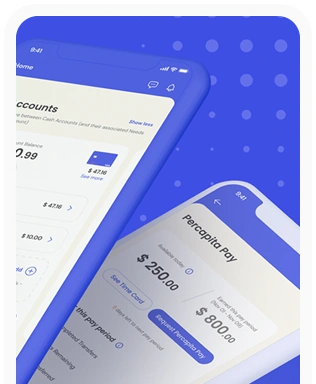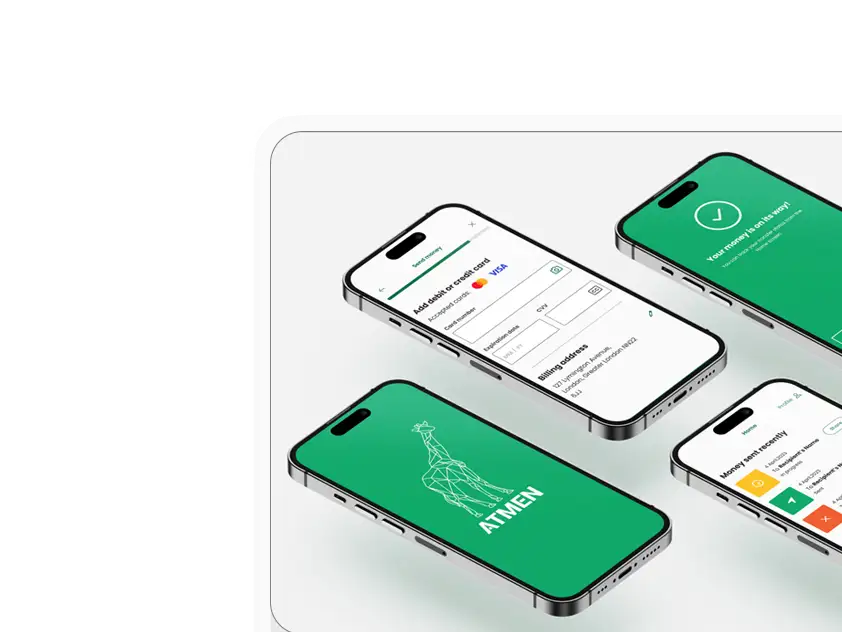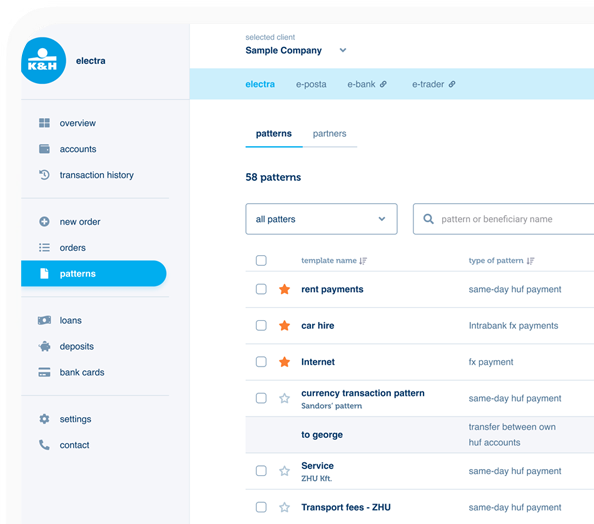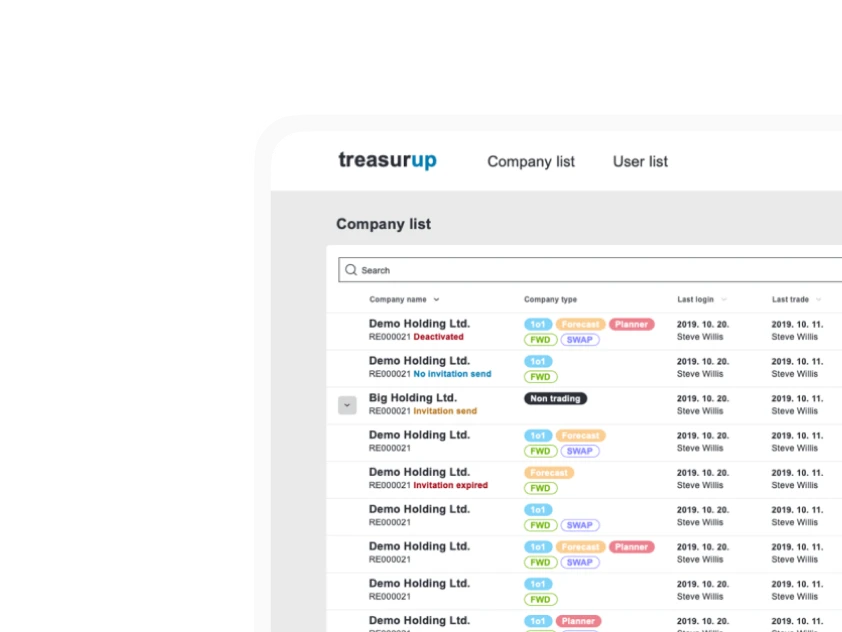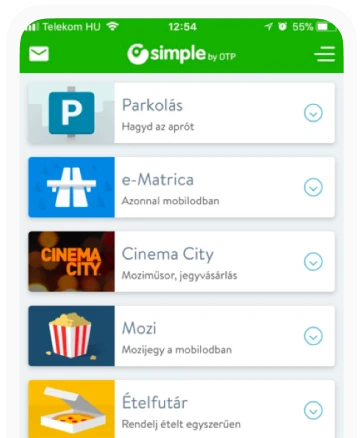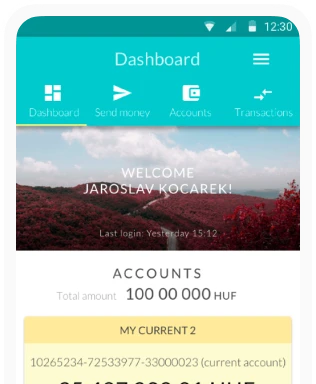Meet Olga Rozskova - Ergomania's talented UX designer
By her own admission, Olga Rozskova is a very organized person. “I know, for instance, what I usually will be doing through the whole summer: Every weekend. And most of the days too!” This detail-oriented mindset is part of the toolkit of a successful UX Designer, working for the Budapest and Amsterdam based Ergomania Design Agency. As such Olga has to be on top of ‘pixel-accurate design’, while also wearing the various hats of project manager and team member. It seems quite some way from the literature-loving student who travelled to the city of her dreams, St Petersburg, to learn the ‘new and shiny soft skills’ of Public Relations, at Peter the Great Polytechnic University. As a reminder of the vast size of the country, Olga says it would take one and a half day’s travel to reach the family home, so she only returned there twice a year. As a result of this distance, from the age of 17 she was immersed in the excitement of Russia’s second largest city and its, “amazing architecture and cultural life.” Looking back Olga now reflects that she might have better devoted her time to gathering some ‘hard skills’, because she came out of her prestigious university feeling that she’d attended something rather like a 19th century ‘finishing school’. “A little bit of languages, and a little bit of good manners, you know…” But despite that, she graduated and prepared to enter the world of work, equipped with a degree in social studies, rather than what she now regards as a preferable and ‘more straight-to-the-point’ qualification.

The Hungarian connection
Meanwhile the connection to Hungary had started through an N GO called BEST – the Board of European Students of Technology – offering exchange possibilities across European technical universities. As an active student representative, Olga attended a gathering of some 300 other students in Poland, and there met a young fellow called Robi from the Budapest University of Technology and Economics. They bonded over a meal of Polish kebabs and cabbage, seasoned with laughter. Then later on, there he was again, in St Petersburg as a soft skills trainer at an event organized by Olga. The rest is history, and today the couple have two children and are residents of Budapest. I’m amused by Olga’s LinkedIn page which twice cites as part of her work experience, ‘Personal development coach – maternity leave’. The goal being to ensure that her son and daughter, “Grow up into balanced and happy human beings.”
So, after university Olga relocated to Hungary, where Robi had begun work as a business consultant. Later he and some friends were to follow their hearts by founding an independent software company, SessionLab. Olga was impressed by the kitchen table startup, which was begun as a hobby project, and was very inspiring for her – for example ‘in not being afraid of doing something you have never done before professionally.’
For Olga, next came a full time job as Marketing Manager for a travel agency – 1000 Ut – where she covered all aspects of marketing and coordination, as well as representing the company at industry fairs and PR events, and travelling frequently to post-Soviet countries. After five years in the travel industry, an all-important first spell of ‘Personal Development Coaching’ lasted for a further two years. Then, wanting to try her hand at working in Hungarian, Olga was back in the job market managing the office of a dynamic IT startup, Commsignia. This required all her organizational skills to work to tight deadlines and included putting together trips abroad for her colleagues. While they got to journey to far-flung places, Olga remained in Hungary, although she does express satisfaction that towards the end of 2023 she’ll attend a UX Conference in the USA as a delegate.
Updating to hard skills
2019 to 2021 saw a second round of ‘PDC’, during which time Olga was able to reappraise her own professional development up to that point. She’d gained a lot of soft skills during her BEST days, with multiple projects to organize. These had included a lot about communication, conflict resolution and presentation skills. She had then deployed and enhanced these to good effect in a couple of demanding jobs. But was there more, and could she update to some new hard skills? These days Olga admits that actually marketing and account management can also be hard skills, but at the time the world of IT was looking increasingly interesting, especially UX Design. “I started investigating and meeting people in that business. I was like this very curious toddler constantly asking questions: ‘What does your day look like, what is the goal of this work? How do you communicate and cooperate with other departments?’ If I was going to start investing time and money again in requalification, then this had to be something that I really wanted to do.”
One conversation almost halted Olga before she got started, when a UX Designer told her that people who can’t draw can’t do UX. Period. A bad moment, but Olga pressed on and talked to others, one of whom was much more encouraging, leading to some Coursera online modules, and ever more conversations with UX practitioners. Olga was getting committed to her new direction, and in May 2020 signed up with the xLabs User Experience Design school, which is led by practicing UX and UI professionals. Here Olga discovered three ‘very beautiful’ principles which have guided her in UX Design ever since.
Three beautiful principles
The first is a very strong psychological aspect to the work, where it’s necessary to get into the user’s mind and way of thinking. “How is the product going to be used? What for? What are the use cases? What are the problems the user is facing – so you really have to put yourself out there. It’s not just your own mind or the business’s mind, but you have to be a psychologist.”
That’s all very well, but one thing that most users want is ‘for free’, which isn’t really achievable. So how is that circle squared? Olga agrees that getting everything free could be desirable, along with many other features that users might have on their wishlist. Not everything is possible however, and this is where analytic thinking comes into play. Day-to-day activities therefore include going through lots of information and identifying relevant data. This can consist of research, drawing conclusions based on findings, or brainstorming with stakeholders. The result can be, ‘finding dozens of post-it-notes around you, and then structuring them to find the patterns, and getting from questions to answers. Or questions to better questions, and then answers.’ It’s not just about user needs, but deliverables: to time, to budget, and to business case. The UX Designer represents users, but works for a business, so its interests and goals naturally count.
Then comes the third ‘very beautiful’ part of the combination: Creativity. “You can be good with people, you can have analytical skills, but at the end of the day, it’s still about design,” Olga reasons. “So you need to know how to make the design look clean, but still interesting. If someone’s eye looks pleasantly on it, then they’ll be motivated to use a product.” She reflects that in her previous workplaces her psychological and analytical skills were used to some extent, but her creativity was relatively dormant. “I was not a very artsy person.” Sure she would draw at home in ‘me time’, but felt quite shy about the activity, ‘like someone who only sings in the shower.’ But that was changing.
The interns
Introduced to Ergomania for a three-month internship, from day one Olga and another newbie, Detti, encountered Praxeum training. The name comes from Star Wars… of course. Praxeum is a weekly event of around ninety minutes at Ergomania, it just so happened that Olga and Detti were thrown in at the Praxeum deep end on their very first day of internship. For someone who’d been told that if they couldn’t draw they would never be a UX Designer, Olga was soon doing rapid prototyping and drawing exercises. It was an amazing feeling, she says, with immersion in ‘super-intense’ activities every day. “If there were three projects, then we would switch at least three times in the same day. It was a constant back and forth, and not just domain wise, but activity wise. So you might have a deep interview where you had to prepare a script, and get yourself mentally there: What are the goals? What do you want to get from the user? Not just chit-chatting, but some definite hypotheses. What are the things you can skip? What are the things that a client really wants you to present? The next thing you might need to do was draw wireframes. And then you might find yourself doing best practice desktop research.

Through fire and water
Olga and Detti, “Went through fire and water together” became good friends, and are still colleagues in Ergomania. Their three months turned into two years of working with different experts and teams, by which time the newbies were well-grounded in a huge range of methodologies. One that was particularly interesting to Olga was the Crazy 8s core design technique that challenges people to sketch eight distinct ideas in just eight minutes – the goal being to generate a wide variety of solutions to the challenge. It’s noted in the literature that, ‘Some team members without a design background may find this method intimidating at first.’ However to Olga it seemed that such activities provided an adrenalized time of learning new things every day. She’d travelled a long way from her 19th century-style university course of a little bit of languages, and a little bit of good manners.
Two complementary teams
By 2022 Olga was not only a full time member of the Ergomania team, with a year of various projects under her belt, but had also started work with an OTP Bank project concentrating on chat interface and chatbot development, an area she finds fascinating. Olga is the only Ergomania member, in addition to some other external suppliers. Everyone on the team is ‘young and driven’ and working in Agile in a multi-disciplinary way. Olga contrasts this with a Consultancy approach, where usually the consultant comes in, spots a few problems, then retires from the scene for some time while the problems are addressed. With the OTP team Olga has developers sitting right in front of her, and so there is a constant dialog going on about how best to achieve things. “Hey, I can’t export this icon,” or “How is this supposed to work?” But of course it’s a two-way street and Olga is also conscious of tapping into the knowledge of others, especially to see what is feasible. For instance, will something she might estimate as a few hour’s work only actually take weeks to do? It’s all about seeing the big picture, and constantly adjusting things accordingly. From a business perspective it’s super important for me to know if my design is too complicated to develop. Sometimes a small change can save a week of developer time.
Constant challenges
Olga has also not stopped learning – far from it. “Sometimes it’s hard to see in meetings when each team member says what they’ll be doing in the next two weeks. The backend, for example, is a totally different planet. I’m very aware that every UX designer should invest in learning the elements of programming, and I have done the Python basics… but I’m still a little mesmerized when I see those black screens and code! It’s difficult for me if I don’t understand something, but it gives me perspective. What’s really happening? How does that task, that person influence our work? Is it something I should know about now, or later? Or is it even something not relevant to me? It’s a challenging way of working, but I really get the point of why we do it this way.”
She’s also learning more about how AI might be utilized in chat products. Ergomania has long championed voice technologies, especially in the banking and Fintech arena, and with the increasing use of AI for chat, this is an area that’s really coming into its own. As Olga is dealing with chat and chatbot building every day, she naturally has a high interest and awareness of current AI technology, including Generative AI. She mentions the benefits of voice-enabled banking for people with visual impairment, or anyone who needs their hands free in their work, be it a parent with children, or a surgeon in the operating theater. “AI is getting to be a hotter and hotter topic,” Olga says. “And some days it feels almost overwhelming how much there is to research.”
As a layman I ask Olga to comment on the frequently-raised concerns about using GPT systems within a banking environment. She responds that as yet the models are prone to inaccurate answers, and of course within a banking environment it is vital to always give the correct answer to customers’ questions. At the current level of development, the agent-assist function is a good direction, where the generative model helps the operator, but human approval is still required. So fine, use the unprecedented power and scope of Large Language Models to create a chatbot, dealing specifically with the needs of customers.
Always encourage
Olga was something of a surprise pick to join the OTP team, at least in her own estimation. Along with a couple of others from Ergomania she attended interviews at the bank, but felt that being a non-native speaker would probably disqualify her from the work. “So why me?” For around six months Ergomania had offered support in increasing her proficiency in Hungarian – not by conventional language teaching, but with a pronunciation coach to tackle the myriad special sounds. So language was not so big a problem, and Olga believes that she was chosen for the work because of the team fit. She was also by this time a veteran of several UX projects within Ergomania. “What is also interesting about this whole UX thing is that at least 50% of our work is about communication. You need to make sure that during the review of your designs, you deliver the right message, and don’t start saying: ‘Oh, sorry, I haven’t finished this one yet, it’s gonna be different.’ For every picture, every single point, you need to know the reasoning behind it.” She describes searching for a common language with developers, who have one thing that might be obvious to them, and don’t get another aspect at all. Olga sometimes wants to say, “Guys, can’t you see the difference!” The Designer might have an instinctive feel for the balance of a page, like where an icon sits within the text, or how wide a margin should be. That doesn’t necessarily translate to Developer-speak, but Olga cautions against ever saying things like, “What the hell have you done with my design!” The watchwords are Never demotivate, always encourage.
Use the parking lot when needed
“We recently had a situation where a backend developer was trying to figure out something very complex, and asked our whole team to workshop: It took us rounds and rounds to get to the same level of understanding as him.” If that sounds frustrating, Olga stresses that it’s not. In fact she says her passion is for creating and steering workshops. She makes the distinction from meetings, where people might just randomly share opinions. Instead, get all stakeholders together in an organized process of ideation and creation and the right results start coming. This is also how resilient teams are built.
“A management person from the client side can have something in mind, but even their close colleague might not understand exactly what they’re wanting to build, or which features will be included.” So part of Olga’s work is to help get everyone aligned. “And meanwhile, you bring in the frameworks of different workshops to figure out how the whole product will look. Again, it’s this semi-psychologist, semi-facilitator technique that you need to use to stop people at the right time, or speed them up, or dig deeper, to get to the parts that are relevant. And if you do stop them, it has to be in a way that they don’t feel diminished. So I might say something like, Hey, that’s wonderful, let’s put it in the parking lot for now and return to it later.” The term ‘Parking Lot’ is a useful concept to show that the idea is valued and will be temporarily stored for re-examination. “That way the person feels appreciated, and meanwhile, it’s not ruining the whole agenda.” I’m put in mind of that ‘Personal Development Coach’ who has been gaining a ton of on-the-job experience since 2016, first with daughter Gréti, then son Rajmi.
The joy of UX
So is Olga an Ergomania person, or an OTP person? Well, both teams get her commitment and allegiance, and she’s very comfortable moving between the two companies and environments. “I feel like I belong in both.” She talks enthusiastically about an OTP Hackathon that she and the bank team attended for an event with, “an amazing atmosphere” which started on a Thursday morning and finished the next day at lunchtime. So banking can be fun? For sure, says Olga. As a bank account user you should expect seriousness from the people handling your money, but there is also scope in HR processes, or accounts for young people, that can be lighter in tone. And then Olga adds something that really catches my attention: “Design should be both functional and joyful.”
A UX Designer’s job description?
And outside the high pressure, joyful world of UX Design for Ergomania, and client OTP Bank, what else gets Olga going? Well, there are still all those classic Russian writers to catch up on, and a passion for ballet, as a trained dancer. These days that has translated more into Salsa and Zumba, so she can “dance and do cardio at the same time.” Then there’s also a love of the great outdoors, shared with husband Robi, on hiking trips in the Tatra mountain region of Slovakia, as well as the Rax range in Austria, the Făgăraș Mountains of Romania, and trails in Slovenia. “What I really love is that when you are in nature, especially with people you are very close to, there’s nothing to disturb you. No civilization, and you just think of the very basic stuff like where to step next, when you will eat, and how the weather is going to change. These primal feelings are so dominating. And it’s such a good experience to share with someone because you’re not there just for the easy parts, but also for the hard parts.”
Which strikes me as a useful job description for the work of a UX Designer: part Psychology, part Analysis, part Creative… And, in the case of Olga Rozskova, a whole lot of organizational skills.


